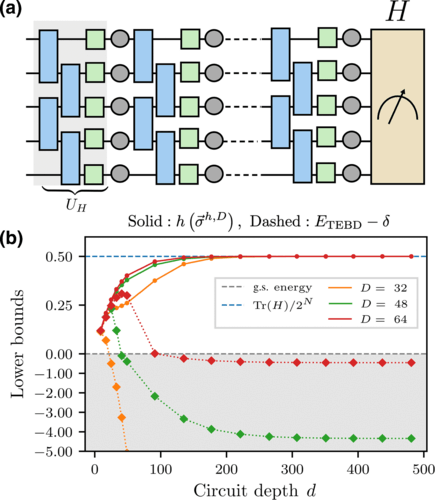Quantum computers have the potential to outperform classical computers in finding ground states of classical and quantum Hamiltonians, a problem that arises in studying the equilibrium properties of condensed matter systems. However, noise in quantum devices places a severe constraint on the performance of these quantum algorithms. Researchers from Stanford University, the Max Planck Institute of Quantum Optics, and the University of Washington have proposed a method for efficiently computing rigorous bounds on the performance of any specified quantum circuit in the presence of a constant rate of depolarizing noise. The method uses Lagrangian duality to account for the circuit architecture and the increase in entropy due to noise.
What is the Potential of Quantum Computers in the Presence of Noise?
Quantum computers and simulators have the potential to outperform classical computers in finding ground states of classical and quantum Hamiltonians. This is a problem that arises in studying equilibrium properties of condensed matter systems. Classical optimization problems can also be framed as finding ground states of commuting Hamiltonians. Quantum algorithms for finding Hamiltonian ground states have been extensively studied in search of a possible quantum advantage. Algorithms based on phase estimation and adiabatic evolution have been proposed for solving this problem and have even been shown to be efficient for specific classes of Hamiltonians.
However, current noisy intermediate-scale quantum devices do not perform quantum error correction and consequently, noise places a severe constraint on the performance of these quantum algorithms. From a theoretical standpoint, it has become of interest to develop no-go results by providing theoretical bounds on the minimum energy that a noisy quantum circuit can achieve for a given Hamiltonian. If a classical algorithm could obtain an energy better than this lower bound, then we can conclude that a reduction in noise rate is necessarily needed for a possible quantum advantage.
An approach to assessing the impact of noise on quantum algorithms is to directly simulate the circuit. The presence of noise in quantum circuits is expected to make them easier to classically simulate. There have been several recent demonstrations of noisy quantum circuit simulations using tensor network methods. However, most of the tensor network methods lack rigorous accuracy guarantees and cannot certify an accurate simulation of the quantum circuit. They are expected to deviate significantly from the circuit output as the noise rate continues to decrease and thus fall short of rigorously providing a no-go result for quantum advantage.
Can Quantum Information Theory Provide a Solution?
This problem can be approached analytically using tools from quantum information theory. For instance, the increase in entropy of the quantum state due to noise can allow for an analytical lower bound on the attainable minimum energy. However, while providing rigorous no-go results, these analyses were circuit-architecture independent and were thus expected to underestimate the impact of noise. Certain circuit architectures are expected to significantly worsen the impact of noise and this phenomenon has been theoretically demonstrated in random quantum circuits models. However, it remains unclear if it is possible to provide an architecture-dependent lower bound for a specific engineered quantum circuit.
In this article, a method is proposed for efficiently computing rigorous bounds on the performance of any specified quantum circuit in the presence of a constant rate of depolarizing noise. The key insight behind the proposed method is the formulation of a Lagrangian dual corresponding to the circuit dynamics, which allows us to account for the circuit architecture in addition to the increase in the entropy or equivalently the decrease in the purity of the quantum state.
What is the Role of Lagrangian Duality in Quantum Computing?
The Lagrangian dual yields a hierarchy of classically computable lower bounds on energy with respect to a specified Hamiltonian obtained at the output of a noisy quantum circuit. Numerical and analytical evidence is provided that this formulation can capture the circuit-architecture-dependent propagation of errors through the noisy quantum circuit and thus provide more stringent lower bounds than currently available.
The work is in part motivated by the application of Lagrangian duality to provide performance bounds on classical physical systems and quantum optical devices. The use of Lagrangian duality in this context is a novel approach that could potentially lead to significant advancements in the field of quantum computing.
What is the Significance of this Research?
This research is significant as it addresses a key challenge in the field of quantum computing – the impact of noise on the performance of quantum algorithms. By developing a method to compute rigorous bounds on the performance of any specified quantum circuit in the presence of noise, the researchers have provided a valuable tool for assessing the feasibility of quantum advantage in real-world applications.
Furthermore, by incorporating the concept of Lagrangian duality into their method, the researchers have introduced a new approach to the problem that takes into account both the increase in entropy due to noise and the specific architecture of the quantum circuit. This could potentially lead to more accurate assessments of the performance of quantum circuits and contribute to the ongoing development of quantum computing technology.
Who are the Key Contributors to this Research?
This research was conducted by Sattwik Deb Mishra from the Ginzton Laboratory at Stanford University, Miguel FríasPérez from the MaxPlanckInstitute of Quantum Optics in Germany, and Rahul Trivedi from the Electrical and Computer Engineering department at the University of Washington. Their combined expertise in quantum computing and quantum optics has contributed to the development of this novel method for assessing the performance of quantum circuits in the presence of noise.
Publication details: “Classically Computing Performance Bounds on Depolarized Quantum Circuits”
Publication Date: 2024-04-19
Authors: Sattwik Deb Mishra, Miguel Frías-Pérez and Rahul Trivedi
Source: PRX Quantum 5, 020317
DOI: https://doi.org/10.1103/PRXQuantum.5.020317

